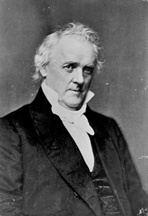James Buchanan: Difference between revisions
Pat Palmer (talk | contribs) m (Text replacement - "President of the United States" to "President of the United States of America") |
mNo edit summary |
||
| (6 intermediate revisions by one other user not shown) | |||
| Line 1: | Line 1: | ||
{{subpages}} | {{subpages}} | ||
{{Image|Jbuchanan.jpg|right|350px|James Buchanan}} | {{Image|Jbuchanan.jpg|right|350px|James Buchanan}} | ||
'''James Buchanan''' (1791-1868) was an [[United States of America|American]] politician and the 15th [[President of the United States of America]], serving from 1857 to 1861. He was born in [[Pennsylvania]] and was the only president in the history of the United States that was never married. Prior to his presidency, he once served in [[House of Representatives]], the [[U.S. Senate]] and as the [[Secretary of State]] under President [[James K. Polk]]. He was a member of the [[Democratic Party]]. | '''James Buchanan''' (1791-1868) was an [[United States of America|American]] politician and the 15th [[President of the United States of America]], serving from 1857 to 1861. He was born in [[Pennsylvania (U.S. state)|Pennsylvania]] and was the only president in the history of the United States that was never married. Prior to his presidency, he once served in [[House of Representatives]], the [[U.S. Senate]] and as the [[Secretary of State]] under President [[James K. Polk]]. He was a member of the [[Democratic Party]]. | ||
Buchanan's presidency was primarily known for the escalating conflict between the Northern and Southern factions. In 1860, the [[ | Buchanan's presidency was primarily known for the escalating conflict between the Northern and Southern factions. In 1860, the [[Republican Party (United States)|Republican Party]] candidate [[Abraham Lincoln ]] was elected to replace Buchanan. Lincoln was against [[slavery]] and advocated Northern interests, angering the South, which sought to succeed from the Union. Buchanan was unable to halt the succession and the subsequent outbreak of [[American Civil War]]. | ||
Buchanan also oversaw the United States federal government forces against [[Utah]] during the [[Utah War]] of 1857 to 1858, a war which the federal troops defeated the Utahan force led by [[Brigham Young]]. | Buchanan also oversaw the United States federal government forces against [[Utah (U.S. state)|Utah]] during the [[Utah War]] of 1857 to 1858, a war which the federal troops defeated the Utahan force led by [[Brigham Young]]. | ||
==References== | ==References== | ||
| Line 14: | Line 14: | ||
{{succession box| | {{succession box| | ||
before=[[Franklin Pierce]]| | before=[[Franklin Pierce]]| | ||
title=[[President of the United States]]| | title=[[President of the United States of America]]| | ||
years=1857-1861| | years=1857-1861| | ||
after=[[Abraham Lincoln]] | after=[[Abraham Lincoln]] | ||
}} | }} | ||
{{end box}} | {{end box}}[[Category:Suggestion Bot Tag]] | ||
Latest revision as of 16:01, 3 September 2024
James Buchanan (1791-1868) was an American politician and the 15th President of the United States of America, serving from 1857 to 1861. He was born in Pennsylvania and was the only president in the history of the United States that was never married. Prior to his presidency, he once served in House of Representatives, the U.S. Senate and as the Secretary of State under President James K. Polk. He was a member of the Democratic Party.
Buchanan's presidency was primarily known for the escalating conflict between the Northern and Southern factions. In 1860, the Republican Party candidate Abraham Lincoln was elected to replace Buchanan. Lincoln was against slavery and advocated Northern interests, angering the South, which sought to succeed from the Union. Buchanan was unable to halt the succession and the subsequent outbreak of American Civil War.
Buchanan also oversaw the United States federal government forces against Utah during the Utah War of 1857 to 1858, a war which the federal troops defeated the Utahan force led by Brigham Young.
References
